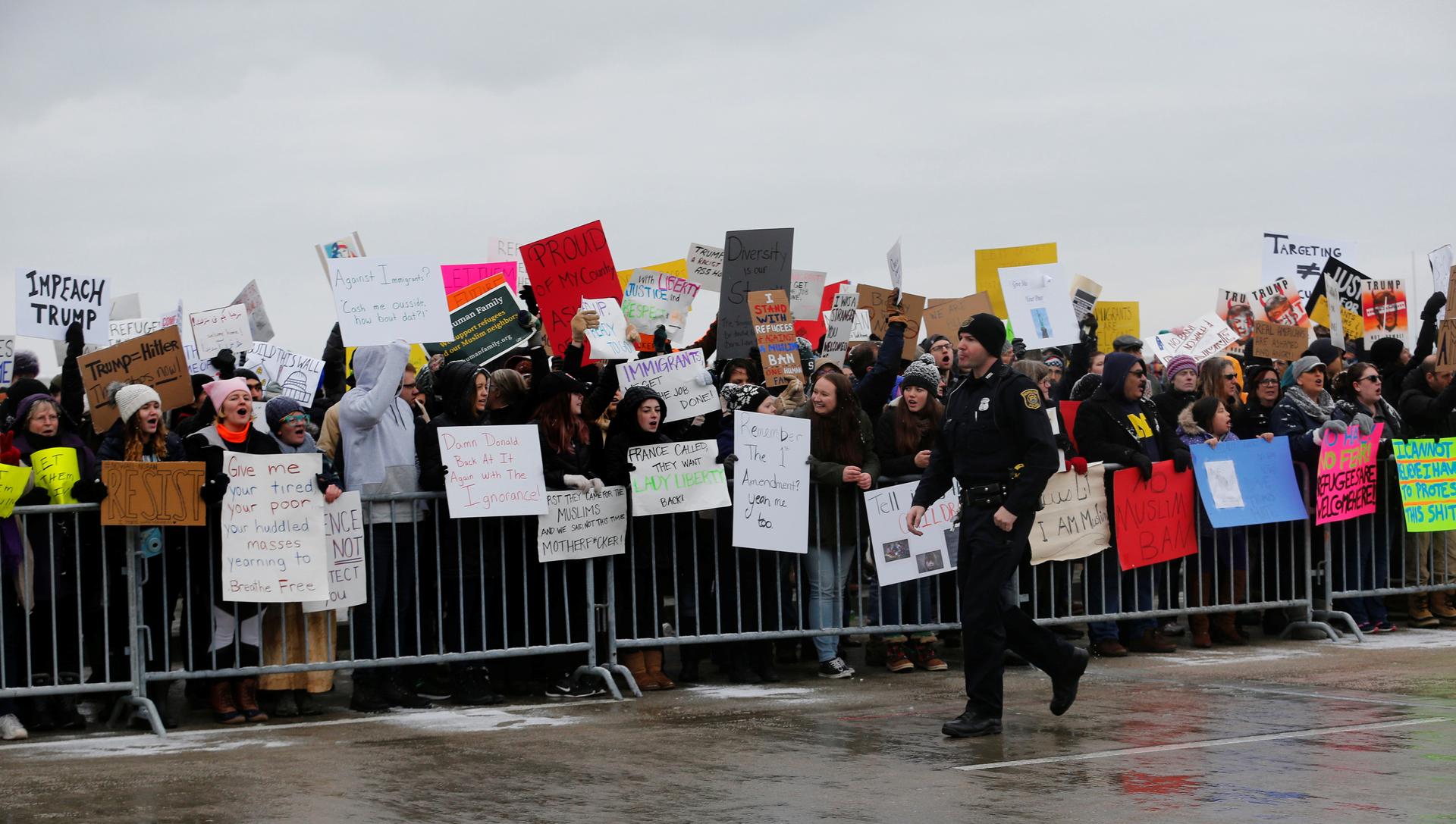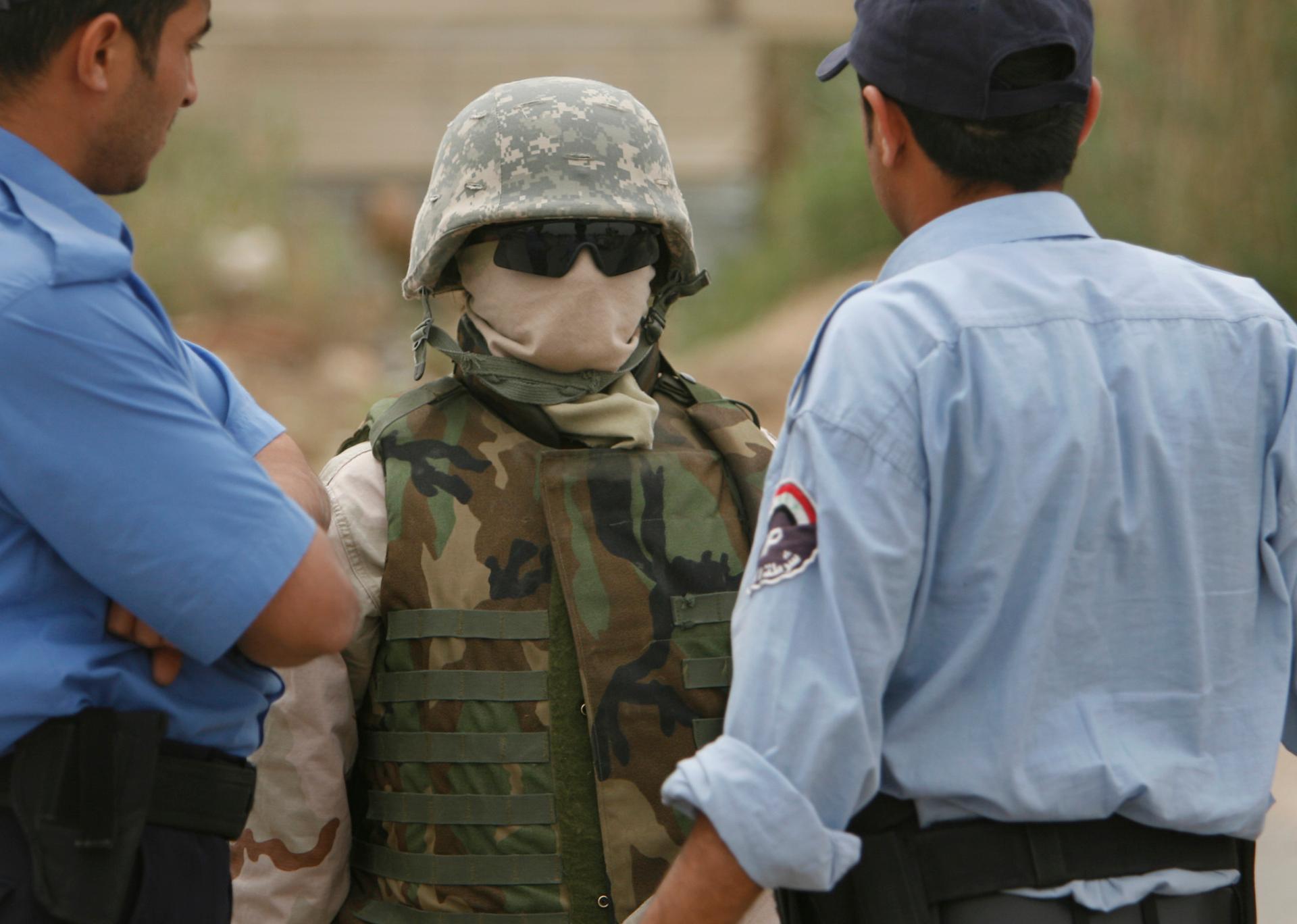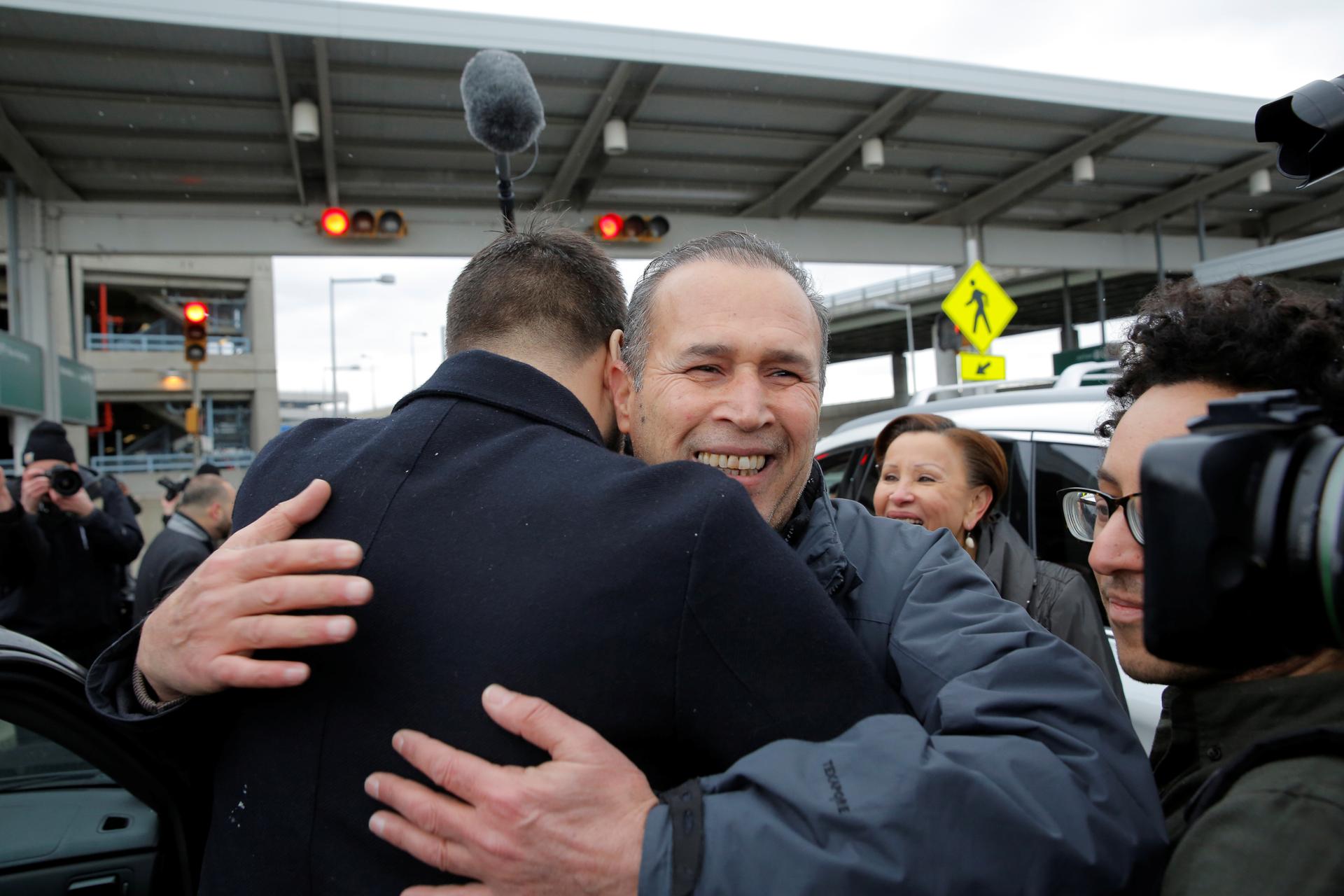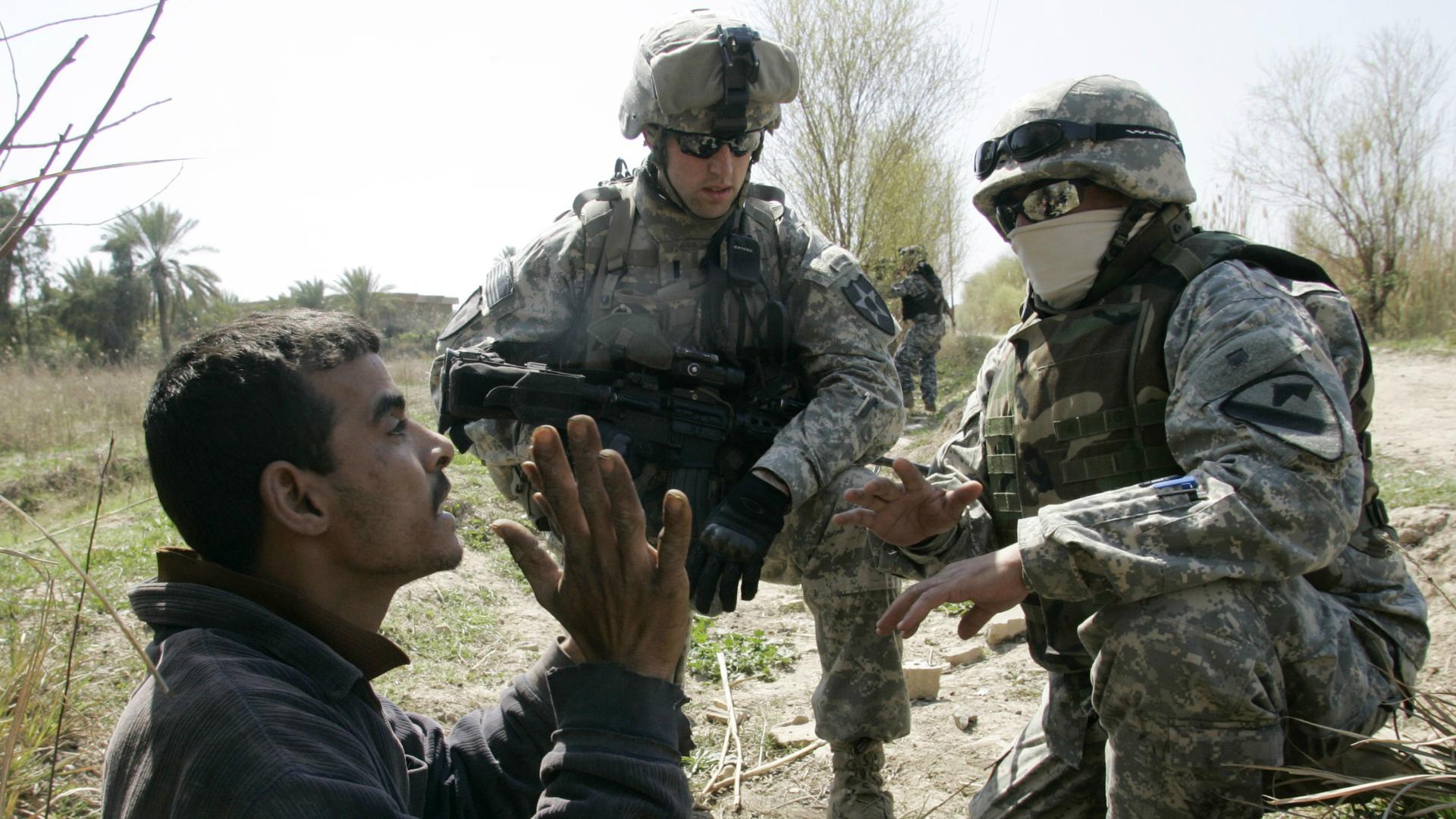Iraqi translators who served the US military are desperate for an exemption to Trump’s travel ban
A US soldier of the 2nd Platoon Charlie Troop, 3rd Squadron of 61st Cavalry Regiment questions a man with an interpreter (R) while on patrol with Iraqi National Police in a suburb of Baghdad, March 7, 2007.
Ahmed Hameed, an Iraqi who served US forces for three years as an interpreter, has barely gotten any sleep over the past three days.
Refused entry under the provisions of President Donald Trump’s executive order Friday restricting travel to the US for citizens of seven Muslim-majority countries, Hameed has been staying up late at night in a Baghdad apartment watching cable news. He's been looking for a sign that he'll be able to travel to the US after the Pentagon submits a new list of Iraqis who translated for and fought with the Americans after the 2003 invasion.
On Sunday, an officer from the Department of Homeland Security refused passage to Hameed and his pregnant wife as they were about to board a Qatar Airways flight to Atlanta, where his sister Nour already lives with her two children.
“Nour got approval to immigrate to the United States because of my service with the American forces,” Hameed said. That did not matter to the officer who turned him away at the Doha airport in Qatar on Sunday, he said.
“He was a small man with a quiet voice and respectfully he said, 'I’m sorry but I’m implementing an executive order from President Trump.' At least the airline felt sorry for us. They paid for the ticket back to Baghdad.”

Hameed is just one of thousands of Iraqis who have worked with the US during its post-9/11 military operations there. In many cases, they were risking their lives to do so and faced reprisal from insurgents who considered them traitors. In exchange for their service, those Iraqis and their counterparts in Afghanistan became eligible for special visas to settle in the United States. But the Special Immigrant Visa (SIV) program, which began in 2007, has long been backlogged. Some applicants have been waiting for more than five years for their visas to be processed. Now, the president's travel ban has created a new obstacle for former Iraqi partners, who remain in danger despite no longer working for the US.
Currently, Hameed and his wife are staying with a cousin in the al-Karkh neighborhood on the west side of Baghdad, where a diminishing number of Sunni Muslims live in tall concrete apartment blocks built during the Saddam Hussein era. He had already prepared for a new life in the US after finding out on Jan. 10 that his SIV had been approved.
“I sold my apartment in this neighborhood and my Nissan Sunny and gave the money to my mom,” Hameed said. “After waiting for four years I dropped everything and ran to the embassy.”
For security reasons, Hameed won’t say which American military unit he served with as a translator. After the drawdown of US forces in 2007, he took a position with KBR, a US defense contractor formerly a subsidiary of Halliburton, and completed a degree in dentistry from Baghdad’s al-Mustansiriya University. He had been looking forward to civilian life in America after living for years in fear, knowing that he was hated for assisting the United States.
“I’ve received so many threats because of my working history," he said. "The last incident was the week before we left for the airport. Someone tried to break into the house while my wife was alone. She called me at work while she was hiding in the bathroom.”
"Hopefully this nightmare will be over shortly,” Hameed added.
‘They have already gone through extreme vetting’
Former Army Capt. Matt Zeller, co-founder of No One Left Behind, a nonprofit that resettles translators and others who helped American forces in Iraq and Afghanistan, says his group has received over 2,000 messages from Afghans and Iraqis currently hunted by the Taliban, ISIS and other sectarian militias for supporting the US operations. Iraqis have been trapped by the new executive order, and Afghans worry that Trump could expand the ban beyond the original seven countries.
Zeller dismisses the stated reasoning behind the order.
“The idea that we don’t know who these people are — the Iraqis and Afghans who served with us — is patently absurd,” Zeller said. “They talk about extreme vetting but these people already went through it.”

“To get these visas from Iraq and Afghanistan you had to have served with our forces in the war, gone through the most stringent independent background checks from more than five of our security agencies and have an American sponsor,” Zeller explained. “They have already gone through extreme vetting.”
These Iraqis and Afghanis save US lives, Zeller says, and Trump’s action hurts US missions abroad.
“Without Janis, my translator, I would not be alive today. I would have been killed by two Taliban fighters in the hills of Afghanistan,” Zeller said. “President Trump’s order permanently harms our national security.”
Zeller secured entry to the US for his Afghan translator Janis Shinwari in September 2013 and shortly afterward they started No One Left Behind together. No One Left Behind is now petitioning the Trump administration to exempt wartime translators from the ban.
‘What did I do for this country?’
Other vets have joined Zeller in demanding an exemption for former Iraqi partners like Hameed Darweesh, an Iraqi interpreter held for 17 hours at New York’s John F. Kennedy International Airport after Trump signed his order.
When Jon Soltz, an Iraq War veteran and chairman of VoteVets, a nonpartisan political action committee, heard about Darweesh’s detention, he was outraged.
“The idea that we would be detaining Iraqi interpreters who put their lives on the line to help troops like myself in Iraq is disgraceful,” Soltz said. “The thought that this is the result of Donald Trump's hateful, stupid, poorly constructed executive order is infuriating.”
Brandon Friedman, an infantry officer in the 101 Airborne Division who worked with Darweesh, was upset, too. Friedman praised his translator’s brave service on behalf of the US.

“He has done more for America than most people who were born here,” said Friedman, who has sponsored two of the Iraqi translators who served alongside him in combat. "Hameed put his life on the line — and his family’s — to assist US troops."
“He is one of the bravest people I ever met," he added. "When we were all wearing body armor and we didn’t have any for the translators, Hameed went out wearing khakis and a baseball cap while we were suited up in Kevlar.”
After immigration lawyers secured Darweesh’s release from JFK, he told a crowd of demonstrators and reporters: “What did I do for this country? [And yet] they put the cuffs on. You know how many soldiers I touch by this hand?”
‘I respect that they want to protect their country’
Back in Baghdad, Hameed hopes things will still work out for his family and other Iraqis in his position.
“I can excuse the fear Americans have and I respect that they want to protect their country,” said Hameed. “But at the same time, there are hundreds of people who jeopardized their lives and those of their families to help the United States mission in Iraq and I’d like Mr. Trump to take that into consideration.”
